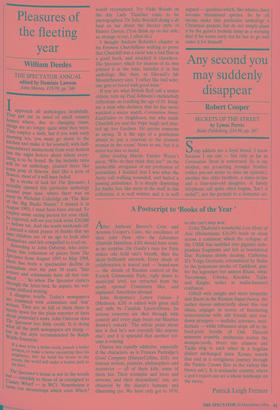A Postscript to 'Books of the Year'
After Anthony Beevor's Crete and Artemis Cooper's Cairo, the excellence of their joint Paris After the Liberation (Hamish Hamilton, £20) should have come as no surprise. De Gaulle's race for Paris makes one hold one's breath; then the skein brilliantly unravels. Every shade of collaboration is traced and — brand-new — the details of Russian control of the French Communist Party, right down to municipal level, are extracted from the newly opened Comintern files, and explained. Anecdotes abound.
John Betjeman's Letters Volume I (Methuen, £20) is edited with great skill and style by Candida Lycett-Green. Its serious concerns are shot through with comedy and every page bears out Maurice Bowra's remark: The whole point about him is that he's not remotely like anyone else', and it is splendid that another vol- ume is coming.
Diaries are equally addictive, especially if the characters, as in Frances Partridge's Good Company (HarperCollins, £18), are famous writers, painters, philosophers and eccentrics — all of them kith, some of them kin. Their triumphs and loves and sorrows, and their descendants' too, are observed by the diarist's humane and discerning eye. We have only got to 1970, so she can't stop now.
Colin Thubron's wonderful Lost Heart of Asia (Heinemann, £16.99) leads us clean across a continent which the collapse of the USSR has tumbled into gigantic inde- pendent fragments and left in bewildered flux; Russians slowly decamp, Catherine II's Volga Germans, retranslated by Stalin to the poisonous smoke of Tashkent, pine for the legendary but unseen Rhine, while Turcomans, Uzbeks, ICazakhs, Tajiks and Kirghiz welter in mafia-haunted confusion.
Gifted with insight and stern sympathy and fluent in the Russian lingua franca, the author moves unhurriedly about this vast chaos, engages in scores of fascinating conversations with old friends and run- down strangers — mullahs, actresses, intel- lectuals — while tribesmen slope off to the hard-porn booths of Osh. Timurid minarets crumble, mulberries scatter the mosque-yards, rivers run crimson and Tajiks sing to each other in a Sogdian dialect unchanged since Xerxes; travels that end in a vertiginous journey through the Pamirs ('crows flew in the valleys like blown ash'). It is avalanche country, where a gun's report can set a whole landscape on the move.
Patrick Leigh Fermor


































































 Previous page
Previous page